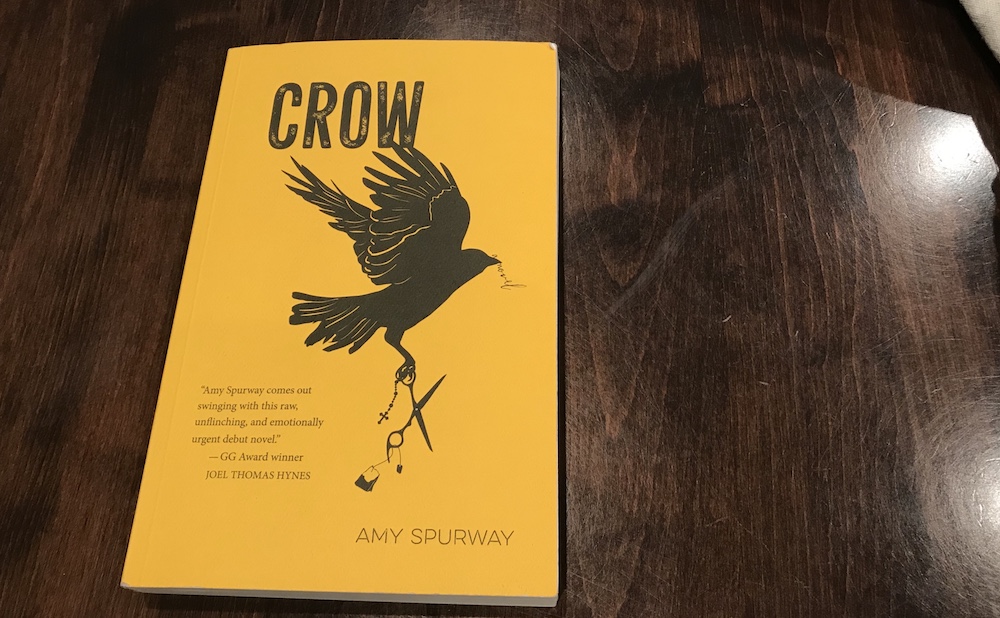Fiction
Q&A with Amy Spurway, author of Crow
First-time novelist finding 'humour in the darkest of times'

caption
Crow is Amy Spurway's first novel.A writer from Cape Breton is paying homage to the island through her first novel.
Amy Spurway’s novel, Crow, was launched in Halifax on March 26. It’s her first book, though the Dartmouth resident has been a writer for many years.
At age 11, she started working for the CBC doing commentaries that she originally performed for her 4H group. She worked various writing jobs in marketing and creative non-fiction before she “fell into fiction.”
Crow is about a woman living in Toronto who learns she has a brain tumour. She returns to her home in Cape Breton determined to write a memoir about her life, but that means she will have to delve into her family’s secrets and confront her own past.
Spurway spoke to The Signal about her book.
How did you fall into fiction?
I started this book shortly after my kids were born. I was really struggling, my oldest children are twins. We were living in Toronto at the time, and we didn’t have friends or family around, so I reached out to an online support group. One of the other mothers came back in response … with a story about a friend of hers who passed away very suddenly leaving a husband and her infant twins behind. It was kind of a story intended to spark gratitude and gratefulness and a real ‘count your blessings’ kind of moment. I freaked out. That threw me for a loop because it was the first time I had really faced my mortality, or considered my mortality even. I realized that the stakes seemed so much higher now. I’ve always processed intense emotion through writing, so I knew I had to work with this really huge meaty universal existential topic. I had to write my way through it and I knew I had to do fiction, so that was really the genesis of this book. Fiction was the only thing that made sense because I wanted to explore a kind of alternate expression of these feelings and these ideas.
Why did you decide to write the book as a dark comedy?
Finding humour in the darkest of times and the darkest of situations is a survival mechanism. It’s a way of coping. We have to find that spark of light and humour in the dark. That comes very naturally to me as a writing style, and I think it’s helpful because it lets us explore all facets of these really complicated things. Nothing is all hilarious and nothing is all horrific, it can really be viewed as one jumbled up ball of all of these things.
How has growing up in Cape Breton influenced your writing?
I think most of my life I was surrounded by characters. The people in my family, the people in my community, my friends, they’re all just so vibrant and interesting and they’re fascinating people with fascinating stories to tell. I think it’s really a place where we’re steeped in storytelling as a culture. I think that really played a huge role in my own development as a writer and a storyteller.
What do you hope readers get out of this book?
My goal in writing this book is making people laugh and making people cry — ideally, both at the same time. If people walk away having had a good chuckle, and maybe a good sniffle, I’m deeply satisfied. Beyond that, I hope people can read this book and then just take some time to reflect on what matters most to them in their lives, kind of how we’re doing our lives, and where we find our truth and where we find our meaning.
After this novel, do you plan on writing more?
I think I have to now. [She laughs.] Yes, novels and fiction, even though like I’ve said I kind of stumbled into it. It’s a really, really great format to work with, so I’ve started hacking away at something else and we’ll see where it goes. I explored kind of the existential issues around mortality with Crow and now as I’m moving into my mid-40s, I want to kind of explore women’s relationship to rage.
This interview has been edited and condensed for clarity.
About the author

Emily McRae
Emily McRae is a journalist based out of Halifax, Nova Scotia.
